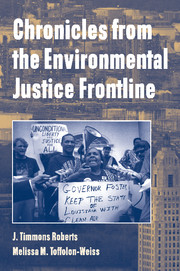Book contents
- Frontmatter
- Contents
- Preface
- 1 Environmental Justice Struggles in Perspective
- 2 Roots of Environmental Injustice in Louisiana
- 3 The Nation's First Major Environmental Justice Judgment: The LES Uranium Enrichment Facility
- 4 EPA's Environmental Justice Test Case: The Shintech PVC Plant
- 5 Media Savvy Cajuns and Houma Indians: Fighting an Oilfield Waste Dump in Grand Bois
- 6 Stress and the Politics of Living on a Superfund Site: The Agriculture Street Municipal Landfill
- 7 The Empire Strikes Back: Backlash and Implications for the Future
- Online Resources on Environmental Justice Struggles
- Suggested Places to Start: A Few Worthwhile Next Readings
- Notes
- References
- Index
6 - Stress and the Politics of Living on a Superfund Site: The Agriculture Street Municipal Landfill
Published online by Cambridge University Press: 05 July 2014
- Frontmatter
- Contents
- Preface
- 1 Environmental Justice Struggles in Perspective
- 2 Roots of Environmental Injustice in Louisiana
- 3 The Nation's First Major Environmental Justice Judgment: The LES Uranium Enrichment Facility
- 4 EPA's Environmental Justice Test Case: The Shintech PVC Plant
- 5 Media Savvy Cajuns and Houma Indians: Fighting an Oilfield Waste Dump in Grand Bois
- 6 Stress and the Politics of Living on a Superfund Site: The Agriculture Street Municipal Landfill
- 7 The Empire Strikes Back: Backlash and Implications for the Future
- Online Resources on Environmental Justice Struggles
- Suggested Places to Start: A Few Worthwhile Next Readings
- Notes
- References
- Index
Summary
TWO MOTHERS ON A LANDFILL
Elodia Blanco was born in New Orleans to a Creole Catholic nurse and her husband, a Guatemalan seaman. The family lived two blocks from the Lafitte public housing project until her parents divorced when she was at an early age. The kids would alternate summers, spending one with her father in San Francisco and the next in Guatemala or traveling with him as he worked as a chef on the ships. By age sixteen, Elodia was married, and two years later she had two baby boys. After a disagreement with her husband, she took her boys to California to live with her father and her “Nanny,” his wife. “I knew I had to get out of New Orleans.” They were the only African-Americans in that part of Marin County, where she lived for a decade. After earning her high school equivalence and studying for several years of college around the Bay Area, Elodia remarried her trucker ex husband and they had a daughter. She moved the family back to New Orleans when her mother took ill. Upon her return, Elodia landed a good job in Mayor Dutch Morial's office as a program manager.
There, she learned about a new federally supported housing development called Gordon Plaza, which sounded perfect for their family's needs and fit within their means.
- Type
- Chapter
- Information
- Chronicles from the Environmental Justice Frontline , pp. 165 - 188Publisher: Cambridge University PressPrint publication year: 2001



